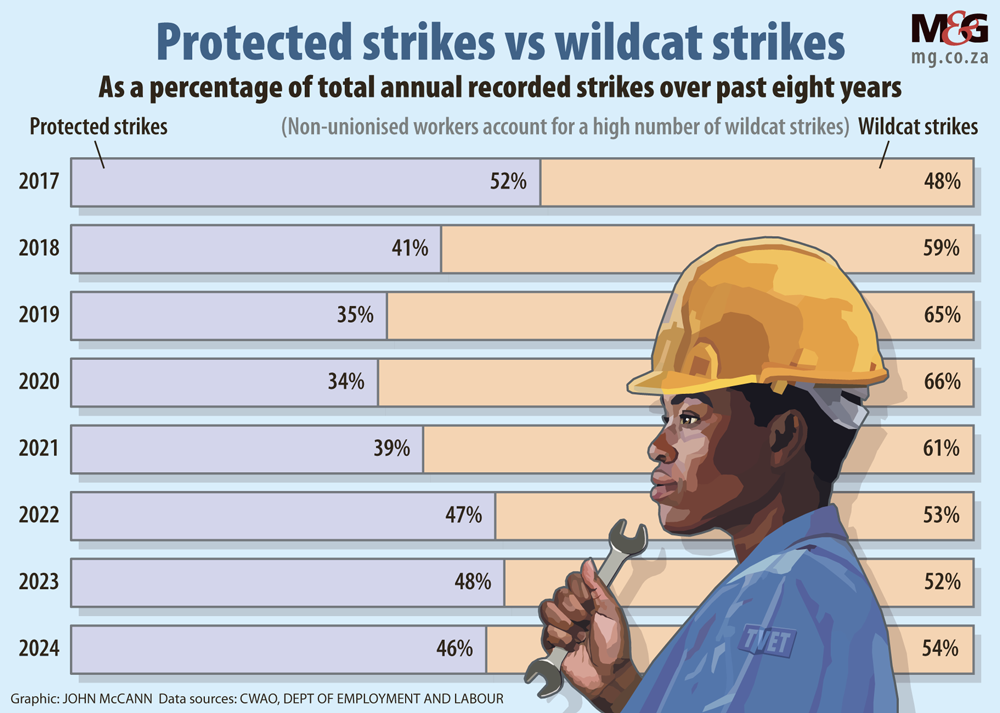Retrenchments, AI, cost of living behind SA’s labour crisis

South African workers face a critical moment as the rise of artificial intelligence (AI) and the casualisation of the workforce threaten to exacerbate retrenchments and the national unemployment crisis.
This was the warning from some of the country’s major labour federations this week ahead of Workers’ Day, recognised locally and globally on 1 May.
At the same time employer organisations say businesses are being squeezed by the cost of meeting regulations, while the public scrutiny of their profit margins remains skewed.
These contrasting perspectives reveal deep fault lines in South Africa’s labour landscape where the official unemployment rate is 31.9%, according to Statistics South Africa’s latest data.
The burning issues in 2025 include AI, climate change and informal work, said Riefdah Ajam, the general secretary of the Federation of Unions of South Africa (Fedusa).
“We are championing workers’ rights in a changing world. We are looking at artificial intelligence and automation. We are looking at climate change … and the ability of collective power to stand up to these changes so that no one is left behind,” she said.
Ajam pointed to hospital group Mediclinic, which recently announced plans to automate administrative functions — a move expected to eliminate up to 1 000 jobs.
“Mediclinic plans to slash jobs as part of an aggressive artificial intelligence and automation strategy aimed at saving nearly R2 billion by 2027, according to the strategy released at Remgro’s recent Capital Markets Day,” she said.
Acquired by Remgro in May 2023, the group has placed a freeze on “nonessential new hires” and is offering severance packages as it turns to AI to “revolutionise operations”.
“Fedusa believes AI presents both challenges and opportunities for the labour force,” Ajam said. “AI cannot completely replace human beings in the work environment.”
But, left unchecked, she said AI and automation could extend beyond admin roles to professions such as nursing and teaching.
“It is about collaboration, to ensure we do not replace humans with robots, but instead complement the functions. If we want to incorporate AI we need to reskill and upskill workers.”
Ajam said informal labour was a growing threat.
“Remote work is becoming a reality and, as a direct consequence, wages are becoming subdued. We want to eliminate that at all costs. Work is work, whether done remotely or at a physical place of work.”
Rising informality has also led to reduced access to benefits — unemployment insurance and occupational injury compensation — particularly for gig workers, delivery drivers and platform workers such as Uber drivers.

“Those are the sectors that are subjected to exploitation the most,” Ajam said, adding that platform labour was finally receiving attention at the International Labour Conference (ILC).
Climate change is also a serious labour issue, because biological hazards caused by deteriorating environmental conditions affect workers.
“With the increase in temperature, we’re seeing shifts in ecosystems that directly impact outdoor workers — from agriculture to tourism to local government. Heat stress leads to decreased productivity, and in some cases, long-term health issues,” noted Ajam.
Labour federation Cosatu’s general secretary, Solly Phetoe, said workers faced “deepening retrenchments”, attacks on collective bargaining and non-compliance with labour legislation.
“Retrenchments used to happen mostly in the private sector but now even government departments, like the Western Cape department of education, want to retrench more than 2 400 educators,” he said.
Phetoe said job cuts had exacerbated unemployment and poverty and accused employers of bypassing labour laws during retrenchment processes.
Negotiating at the National Economic Development and Labour Council, Cosatu had pushed for amendments to section 189 of the Labour Relations Act (LRA) to toughen the terms of retrenchment.
“We demanded that for every year of service, workers must be compensated with four weeks’ salary — not just one. So far we’ve managed to get it to two weeks, and we are still fighting,” Phetoe said.
Another concern was the sustained attack on collective bargaining.
“If the government, the custodian of the law, can ignore a collective agreement and get away with it, what’s stopping private employers from doing the same?” he asked, referencing the failure to implement parts of the 2018 public service wage agreement,” he said.
“The employers no longer see a reason to honour collective bargaining. Even at Eskom, they started withdrawing shop steward agreements mid-term. They are undermining hard-won rights”.
Companies also ignored the Occupational Health and Safety Act, Phetoe said.
“We’ve lost many workers due to employers’ non-compliance. Workers are being injured and then placed on disability,” he said.
Cosatu has supported legislative amendments to give workers, especially in high-risk industries such as mining, the right to refuse unsafe work. These rights are absent from the 1993 Act.
Phetoe said although major gains, such as the national minimum wage, had been won in the post-apartheid era, enforcement remained the Achilles’ heel of labour policy.
“Only 34% of employers comply with employment equity. And when we ask the minister of labour what action is being taken, we see no consequences. Non-compliance must be criminalised,” he said.
Workers face increasingly dire conditions as a result of economic instability, rising living costs and the erosion of permanent employment, National Council of Trade Unions general secretary Narius Moloto said.
“The first major issue is uncertainty. Retrenchments are common, and this fear prevents workers from making long-term commitments,” he said.
“We are witnessing a rise in working poverty, where wages remain stagnant despite inflation, while the cost of basics like electricity and transport continue to soar well beyond inflation.”
Employers had “hardened attitudes” in wage negotiations, he said. “Casualisation is rife — limited duration contracts, outsourcing and subcontracting are now the norm. This limits access to benefits and long-term security. It’s a form of legalised exploitation.”
“Many so-called employed people are contract workers with no stability. We’re seeing a complete outsourcing of core jobs, especially in construction and retail. These trends compromise not only workers’ livelihoods but also the quality and safety of our infrastructure.”
Although the country has formal protections on paper, there is a lack of enforcement, Moloto said.
“Institutions like the CCMA [Commission for Conciliation, Mediation and Arbitration] are overloaded, which reflects the ongoing exploitation of workers. Employers claim labour costs are high, but how can someone who lives in an informal settlement, who can’t buy a home or access credit, be considered ‘highly paid’?” he asked.
The National Employers Association of South Africa, which represents more than 7 000 businesses, argues that businesses are struggling under economic strain and regulatory burdens.
“It’s widely broadcast that workers are being abused in terms of remuneration,” said its chief executive, Gerhard Papenfus.
“But that’s how society is structured. Everything, the price of your product, your overheads, is based on the existing wage structure. You can’t just start paying more.”
He added that the risk of hiring labour and cost of compliance were priced into wages, which would be higher if employers could instantly dismiss a worker for poor performance.
Profitable businesses were essential to worker welfare, he added.
“If it goes well with the employer, it’s beneficial for the employee. Rich employers pay well — that’s how you attract the best talent.”
But the perception of profit as exploitation deterred business confidence. Papenfus said businesses also faced lean years and workers did not understand that a small profit in one year could represent just a slim recovery.
“Employees must work for their employers to do well. Pray for a boss who makes a very good profit — because only then can he pay you more,” he said.
Jaundré Kruger, the national manager of the Consolidated Employers Organisation, cited high unemployment, ongoing labour law reforms and inefficiencies in dispute resolution mechanisms as concerns.
“We have candidates looking for shadow work just to put themselves in different positions to be able to enter the labour market,” he said.
“Students are approaching you to literally work for no pay … to bolster their CV, to be able to go to employers and set themselves apart in a very shrinking market.”
Employers were concerned about the complexity and scale of current labour reforms, including changes to the Labour Relations Act, the Basic Conditions of Employment Act, and the National Minimum Wage, Kruger added.
“The CCMA is extremely backlogged. I understand the CCMA has extreme budget cuts, and I have extreme empathy for them, but it’s worrying that we haven’t had a look at a reform of that process.”
He said there was also a growing burden of compliance on employers.
“What unions and a lot of employees miss is … it’s not always easy to generate and pay salaries. You might have signed a deal three years ago where you tried to project your labour costs, and now that changes,” Kruger said.
“What employers would love employees to understand is that it’s not just you show up and make money. There are regulations to be complied with,” Kruger added.
“It’s very important to keep the lines of communication open between organised labour and business … The cost of living is not decreasing and if we’re not going to work together to move forward … I see dark days ahead.”




